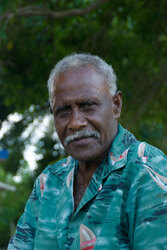 The problem with having 850 words a week is that I can only say one thing at a time.
The problem with having 850 words a week is that I can only say one thing at a time.
Yesterday I wrote about the need for the development of a coherent and unifying political philosophy in Vanuatu. Today, I feel I should explain why the development of such a vision is a difficult – not to say intractable – problem.
This is Chief Kalori of Clem’s Hill. One of the young turks in Efate’s francophone population at the time of the Independence movement of the 1970s, he presided over a community responsive to the French argument for a go-slow approach. As members of a large, distinct minority, they felt they had every reason to fear being overwhelmed and shouted down by the largely Anglican/Presbyterian leadership of the Independence movement.
The French at the time were much more conservative in their approach to Independence. They are presently the last colonial power in the region that hasn’t utterly divested itself of the trappings of overt rule. In the 1970s, the French quietly and not-so-subtly provided assistance to anti-Independence political parties (eventually united under the familiar mantle of the Union des Parties Modérées, or UMP) and supported rebellions on Santo and Tanna.
Picture Kalori, a young man of rank and potential in the 1970s, watching his fathers become isolated and shifted out of power, while young, foreign-educated firebrands radioed political speeches from hiding places in the bush only a few kilometres from his nasara.
The young lawyer who preached, Castro-like, over the bush radio is now President of Vanuatu. Chief Kalori remains in his village, very much the injured lion. He is quick to reprove the country’s founders, men he – not entirely without reason – considered under-educated and ill-prepared for the demands of ruling a newborn nation.
While Kalori is alive, there will be another view of Independence: not undesirable, but in the 1980s untimely and rash. He feels that everything that has transpired since then, the venality, pettiness, lack of political coherence or cohesion… all of this can be laid at the feet of some brash young men who lacked the education and the wisdom to take a more patient tack.
Father Lini did little to ingratiate himself with the francophone population at first. He sent colonial police to deal with the Tannese insurgents, and brokered an agreement with Papua New Guinea’s Prime Minister to bring the Nagriamel leader Jimmy Stevens’ Bow & Arrow Rebellion to an abrupt and somewhat violent end.
Even after the violence was ended, he was not beyond expressing his pique by kicking out the odd French diplomat.
Some years ago, I spent an afternoon listening to a francophone chief from Tanna regale me with the history of cultural tensions in his area. His story culminated in the imprisonment of all the area’s leaders and ultimately the death of the most senior. He paused at the end and said to me in Bislama, “I’m glad you’re French Canadian. What I have said to you today, I could never tell to an anglophone.”
(Apologetically and as tactfully as I knew how, I later disabused the chief of his mistake. He never spoke directly to me again.)
Unity doesn’t come naturally in Vanuatu. As with many cultures, affiliations are complex, beginning with family and radiating from there to include village, island, language and religion. The most closely kept – and contested – are those closest to you, but external threats can quickly make them disappear, at least until the threat subsides.
One remarkably simple and transformative political fulcrum is the externalisation of conflict. It’s infinitely easier to unite against an external threat than against an internal one, let alone for any positive reason. In the 1970s the near total disenfranchisement of the ni-Vanuatu population was sufficient to bring virtually everyone together. Even those opposed to Independence argued against the timing, not the goal.
I often find myself wishing I had met Father Lini, so I might have some inkling why his presence in the political field was enough to hold things together for as long as he did. But lately I’ve come to suspect that had he remained healthy to this day, he might have found himself in his younger brother’s shoes: only one of the larger dogs in a very large, snappy pack.
Popular support and party unity were already diminishing at the time of his fateful stroke following a prayer breakfast with US President Reagan. Some have even speculated that the stroke was not an accident. Perhaps, they say, the mere mention of the word ‘socalism’, albeit in its benign, uniquely Melanesian usage, was enough to excite interest among Langley’s shadowy denizens.
In any case, politics in Vanuatu is very, very personal. While men like Kalori live, grievances live unaddressed. Jealousies are compounded by a sense of missed opportunity, an inversion of ‘there but for the grace of God…’, that continues to animate actors at all levels of Vanuatu politics.
And when that passes, only the venality, the opportunistic pursuit of the quickest, shortest gain, will remain. And that is why it is more important than ever to find something (dare I say anything?) that will allow the new generation’s leaders to elaborate a coherent picture of a future for all of Vanuatu.
I doubt they’ll succeed, but I feel that someone ought to try.
